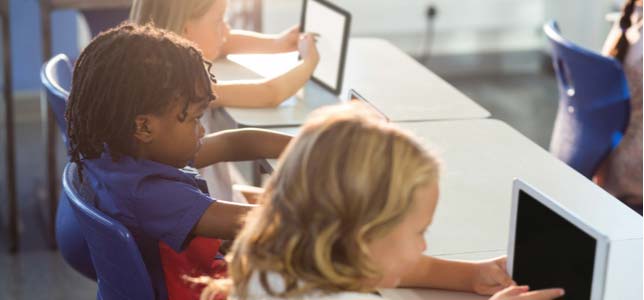Augmenting Learning Through Technology Use
A new report finds technology is becoming more prevalent in everyday learning activities, but the majority of classrooms worldwide are creating blended learning environments.

Almost half of all students globally use a desktop computer during lessons at school, but new technologies have not superseded traditional tools and blended learning, according to a new report from Cambridge International. The report features the results of an international online survey of almost 20,000 teachers and students from ten countries collected between March and May 2018 and explores how students learn inside and outside the classroom and the roles of teachers and students play in measuring success.
While new technologies such as smartphones, smartboards and tablets are starting to be used in classrooms, nine in 10 students are still using a pen and paper during lessons, and 73 percent are using a whiteboard with marker pens. The report found three-quarters of students in the United States are using desktops and smartphones for learning experiences, but China leads the world when it comes to tablet use in classrooms at 50 percent.
"As a leader in an international education, we feel like we have a unique understanding of how students learn and teachers educate," said Mark Cavone, the U.S. regional director of Cambridge International. "In the task of preparing students for their future, it is becoming more difficult. We want to understand not only what students learning but how and what context to share the insights to the wider education community."
The report also highlights other areas of student and teacher engagement:
- Mathematics is the most commonly studied subject around the world in 88 percent of schools, followed by the English language at 84 percent, chemistry at 65 percent and physics at 63 percent.
- Private tutoring is most common in China, followed by India at 55 percent. In the U.S., only one in 10 students has additional lessons outside of school hours. The majority of students (66 percent) are getting tutoring in math, followed by 43 percent in physics.
- Most teachers (71 percent) believe that teaching is a rewarding career, and eight in 10 teachers in the U.S. chose the profession because they like working with young people.
The full Cambridge International report can be found here.
About the Author
 Sara Friedman is a reporter/producer for Campus Technology, THE Journal and STEAM Universe covering education policy and a wide range of other public-sector IT topics.
Sara Friedman is a reporter/producer for Campus Technology, THE Journal and STEAM Universe covering education policy and a wide range of other public-sector IT topics.
Friedman is a graduate of Ithaca College, where she studied journalism, politics and international communications.
Friedman can be contacted at [email protected] or follow her on Twitter @SaraEFriedman.
Click here for previous articles by Friedman.